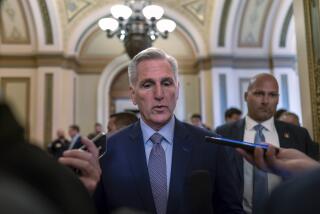Rostenkowski’s Final Drive Still Leaves Health Bill Short
- Share via
WASHINGTON — When the House Ways and Means Committee gets back to work on health care legislation next week, it will have a new chairman--but the same set of problems to face.
Knowing that he likely would be forced to relinquish leadership of the panel because of looming criminal charges, Rep. Dan Rostenkowski (D-Ill.) had worked feverishly in recent weeks to make as much progress as possible.
As his starting point, Rostenkowski had used a bill that was barely approved by the Ways and Means health subcommittee, which is chaired by Rep. Pete Stark (D-Hayward). Modifying the measure in closed-door negotiations with individual Democrats, Rostenkowski managed to get within one vote of the 20 that he needs to win approval on the 38-member committee. Five Democratic members remain uncommitted.
Rostenkowski’s effort ended Tuesday, when a federal grand jury indicted him on 17 felony counts of fraud, embezzlement, conspiracy and obstruction of justice in what prosecutors claimed was more than 20 years of corruption. Under rules of the Democratic Caucus, Rostenkowski had to step down as committee chairman until the charges are resolved.
The incoming chairman, Rep. Sam Gibbons (D-Fla.), has already alerted the committee that he plans to offer his own first draft of a health bill, but aides believe that it will be similar to the one shaped by Rostenkowski. Previously, Gibbons had supported the single-payer system, in which the government finances health care. However, because it would involve a massive tax increase, that system appears to have no chance of passage.
The Ways and Means approach is significantly different from those under consideration in the other committees. It includes the single most controversial feature of Clinton’s plan: a requirement that employers pay the bulk of their workers’ health care costs.
However, unlike Clinton’s proposal, it covers the remaining uninsured with a new form of Medicare. That is a step toward a single-payer system, which presumably would make it more attractive to Gibbons.
Before his departure as chairman, Rostenkowski also had suggested that a broad-based tax could be necessary to make up for a $50-billion shortfall in the bill--a proposal that caused shudders at the White House. That issue is likely to wait until after the Congressional Budget Office produces its cost estimates of the Ways and Means subcommittee bill.
Similar deliberations are going on in four other committees in Congress--two in the House and two in the Senate--and House leaders hope that a breakthrough on Ways and Means could help clear the logjam on some of the other panels. None of the five committees managed to make their self-imposed Memorial Day deadlines for producing their bills.
Because so many committees share jurisdiction over the issue and because it involves so many powerful interests, House and Senate leaders cannot rely on the normal legislative process to produce a single bill that can become law. Thus, it has always been clear that the actual legislation would be written after the committees had done their preliminary work.
However, because no committee has produced a bill, any sense of momentum has been drained out of the process, and that has made members of both the House and Senate even more skittish about voting for such a controversial measure in an election year.
The loss of Rostenkowski appears certain to put more pressure on Energy and Commerce Committee Chairman John D. Dingell (D-Mich.), who also has been unable thus far to find the votes to pass a bill.
Sources said that the Energy and Commerce Committee is considering a “two-bill solution” that could involve approving a version of the President’s plan and one that would lean more toward a competing proposal offered by committee member Jim Cooper (D-Tenn.). The full House then could choose between the plans. Cooper’s bill is less regulatory but does not reach what Clinton has said is his bottom-line requirement: guaranteeing that every American will have health coverage.
The final House committee considering the bill, the Education and Labor Committee, is not considered a true testing ground for health legislation, because it is among the most liberal in the House. But even there, reaching an agreement is proving more difficult than expected.
The disarray in the House appears certain to accelerate health care legislation in the direction that it was already headed--toward resolution in the Senate. There, Democrats still have some hope of bringing moderate Republicans on board, particularly if they can soften the employer mandate so that the burden on the smallest businesses might be lightened.
The Senate Labor and Human Resources Committee already has begun drafting a bill, with Republicans joining Democrats on many of the votes thus far. However, it has not yet dealt with the core issues that divide the two parties.
Those appear most likely to be worked out in the Finance Committee, where Republicans are stronger in number. The Democratic and Republican staffs of the committee are working together over Congress’ weeklong Memorial Day recess in hopes of producing a set of options when the committee members return.
U.S. District Judge Norma H. Johnson scheduled a June 10 arraignment of Rostenkowski at the federal courthouse here. The arraignment initially was set for Monday but was moved at the request of Rostenkowski’s lawyers, according to a spokesman for U.S. Atty. Eric H. Holder Jr. Rostenkowski has proclaimed his innocence.
Times staff writer Ronald J. Ostrow contributed to this story.
More to Read
Get the L.A. Times Politics newsletter
Deeply reported insights into legislation, politics and policy from Sacramento, Washington and beyond. In your inbox twice per week.
You may occasionally receive promotional content from the Los Angeles Times.










